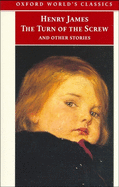Last night I went to see a theatrical adaptatation of THE TURN OF THE SCREW, Henry James' suspenseful novella. Since I had never read it, and I was reviewing it, I hunkered down yesterday afternoon to hopefully enjoy this ghostly tale.
Now before I tell you about how ridiculously scared I was when I finished it, let me make this clear: I am not a person who enjoys scary things. I've read a little Hitchcock and a bunch of Agatha Christie novels, plus a random assortment of Stephen King left behind in my YMCA camp library*, but I get scared enough reading Harry Potter. This holds for other genres too -- not a huge fan of haunted houses, have only seen one "Friday the 13th" movie (and I don't remember which one)... oh wait, I absolutely love "Werewolves of London." There's the exception that proves the rule. So I shouldn't have been surprised that I was easily scared by what, in Jamesian style, is a pretty ambiguous story whose implications are more frightening than what is explicitly stated.
 Essentially, the book begins with a man boasting that he can top another person's ghost story (which we don't hear), because his has not one but two children who see ghosts. The story he tells is from his sister's governess, who once took a job caring for two children in a big, scary mansion in the countryside. The children's guardian, their uncle, asks only that the governess never contact him about anything. Once she gets there, the governess starts seeing two different apparitions and comes to believe that the children are seeing them too, but won't admit it to her:
Essentially, the book begins with a man boasting that he can top another person's ghost story (which we don't hear), because his has not one but two children who see ghosts. The story he tells is from his sister's governess, who once took a job caring for two children in a big, scary mansion in the countryside. The children's guardian, their uncle, asks only that the governess never contact him about anything. Once she gets there, the governess starts seeing two different apparitions and comes to believe that the children are seeing them too, but won't admit it to her:Add a creepy housekeeper and a conveniently placed body of water, and yikes, let me go turn all the lights on my apartment.
It was as if, at moments, we were perpetually coming into sight of subjects before which we must stop short, turning suddenly out of alleys that we perceived to be blind, closing with a little bang that made us look at each other--for, like all bangs, it was something louder than we intended--the doors we had indiscreetly opened.
I won't spoil the ending here, but THE TURN OF THE SCREW is really a work about perception. The young naive governess can't wait to move to the country to start her new position, but gradually she sees the house as a vise whose grip tightens on her every day. When she first meets the children, they are perfectly behaved little cherubs, but the governess gradually comes to distrust them and believe they are hiding something from her. In that sense it echoed James works like DAISY MILLER or WASHINGTON SQUARE, in which the opinions of "society" determine what people see in you--only here, the case for that perception being correct is much more muddied.
I may have been freaked out, but I was able to get over it eventually and enjoyed this quick read. It's a good thing I read the story, too, because the play took certain departures from the source material that I was able to pick up. I haven't finished the review yet, but I will link to it when I'm finished.
Picture: alibris
---
* Didn't your camp have a library? Ours was a dusty nook off the dining hall, someone's donated collection supplemented by the paperbacks others had left behind in their cabins. And that's how I read THE DEAD ZONE, THE TALISMAN and other King books. Oddly enough, they didn't scare me at all.







1 comment:
My camp did have a library! It was a sad, sad little clost in the building we used the least, with one shelf of tattered dictionaries and various French novels and poetry collections that either the counselors or the campers had tried to read for practice before going to French camp and then abandoned.
It's good to see you posting here again--I loved loved loved Portrait of a Lady when I read it and I think you've inspired me to track down The Turn of the Screw.
Post a Comment